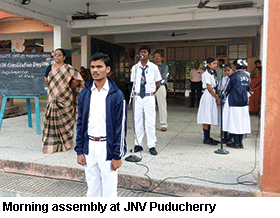 Three decades after introduction of the awards-winning Jawahar Navodaya Vidyalayas (JNVs) across the country, Tamil Nadu (pop.72.1 million) remains the only state that does not host a single one. JNVs are classes VI-XII co-ed, rural, residential schools affiliated with the Delhi-based Central Board of Secondary Education (CBSE) and administered by the Noida-based Navodaya Vidyalaya Samiti (NVS), an autonomous society under the Union ministry of human resource development.
Three decades after introduction of the awards-winning Jawahar Navodaya Vidyalayas (JNVs) across the country, Tamil Nadu (pop.72.1 million) remains the only state that does not host a single one. JNVs are classes VI-XII co-ed, rural, residential schools affiliated with the Delhi-based Central Board of Secondary Education (CBSE) and administered by the Noida-based Navodaya Vidyalaya Samiti (NVS), an autonomous society under the Union ministry of human resource development.
The country’s 598 JNVs offer free-of-charge high quality residential upper primary to higher secondary education to the best and brightest children of the rural hinterland. Arguably the late prime minister Rajiv Gandhi’s most valuable legacy to the nation, successive governments in Tamil Nadu have vehemently opposed JNVs because of NVS’ three-language policy and ‘imposition’ of Hindi as a compulsory language.
However, the incumbent All India Anna Dravida Munnetra Kazhagam (AIADMK) government of the state has been forced to reconsider its adamant stance on JNVs after the Madurai bench of the Madras high court ruled on September 11 that the state government should permit establishment of JNVs. The Madurai bench was hearing a public interest litigation filed by Kumari Maha Sabha, a Kanyakumari-based NGO comprising intellectuals represented by Jeyakumar Thomas, seeking a directive to the AIADMK government to allow setting up of JNVs in the state.
The Madurai bench passed the order after the Union HRD ministry clarified in a letter submitted in court that in accordance with the JNV scheme, Tamil would be the medium of instruction for classes VI-VIII and an additional language in classes XI-XII, if the state government permitted the establishment of JNVs in each of Tamil Nadu’s 32 districts. The NVS spokesperson said the Union government would sanction Rs.30 crore for construction of school buildings in every district, subject to the state providing 30 acres of land free-of-charge for these schools. The bench directed the state government to take a decision within eight weeks.
The main reason behind the continuous opposition to JNVs by successive ruling Dravidian parties in Tamil Nadu since 1986 is that their terms and conditions aren’t in consonance with the state’s two-language policy (Tamil and English) introduced in 1967 by then chief minister C.N. Annadurai of the Dravida Munnetra Kazhagam (DMK) following the anti-Hindi riots which broke out after Hindi was declared the sole national language of India in 1965. Although this decision was soon reversed with English accorded par status as the associate national language, the state government continued to protest the teaching of Hindi in the state as a compulsory language.
According to NVS spokespersons and informed educationists in Tamil Nadu, there’s a huge misconception in the state about the NVS’ language policy. They clarify that the medium of instruction of children in classes VI-VIII is the regional language with English taught rigorously as the second language. Subsequently, JNVs switch to English as the medium of instruction with the regional language (or any other) being taught as the second language. Moreover, all JNV schools in the south are linked with specific schools in the north and follow a ‘migration policy’ under which 25 percent of the brightest class IX students transfer from JNVs in Hindi-speaking states to JNVs in non-Hindi speaking states, and vice versa for a whole year. Therefore, the second language for class IX students is the regional language of the state to which they migrate.
“The JNV language policy is in consonance with Tamil Nadu’s language policy and does not violate the Tamil Nadu Tamil Learning Act, 2006. The migration policy of JNVs in class IX promotes national integration and exposes students to the language and culture of another state. The state government must change its rigid mind-set and allow the establishment of JNVs in Tamil Nadu so that rural students can avail of excellent all-round education,” says B. Venkateswaran, principal of JNV, Puducherry, who appeared in court on behalf of NVS to clarify the JNV philosophy and language policy.
With the language hurdle having been sorted out, it is now up to the incumbent AIADMK government to shed its political fixation and permit the setting up of JNVs in the state. Very recently, the AIADMK and other political parties raised a hue and cry about the National Eligibility-cum-Entrance Test (NEET), the sole entrance exam for admission into medical and dental institutions across the country, being disadvantageous to students in rural areas given their limited access to test prep institutions and inability to afford them. The JNVs which offer 75 percent reservation to students from rural areas and have proved themselves to be as good as the Kendriya Vidyalayas, are a solution to this problem. The AIADMK government would do well to give the green light to reach high-quality class VI-XII education to meritorious students in rural areas, instead of harping on the state’s language policy and ruining their chances for availing provenly excellent education.
Hemalatha Raghupathi (Chennai)























